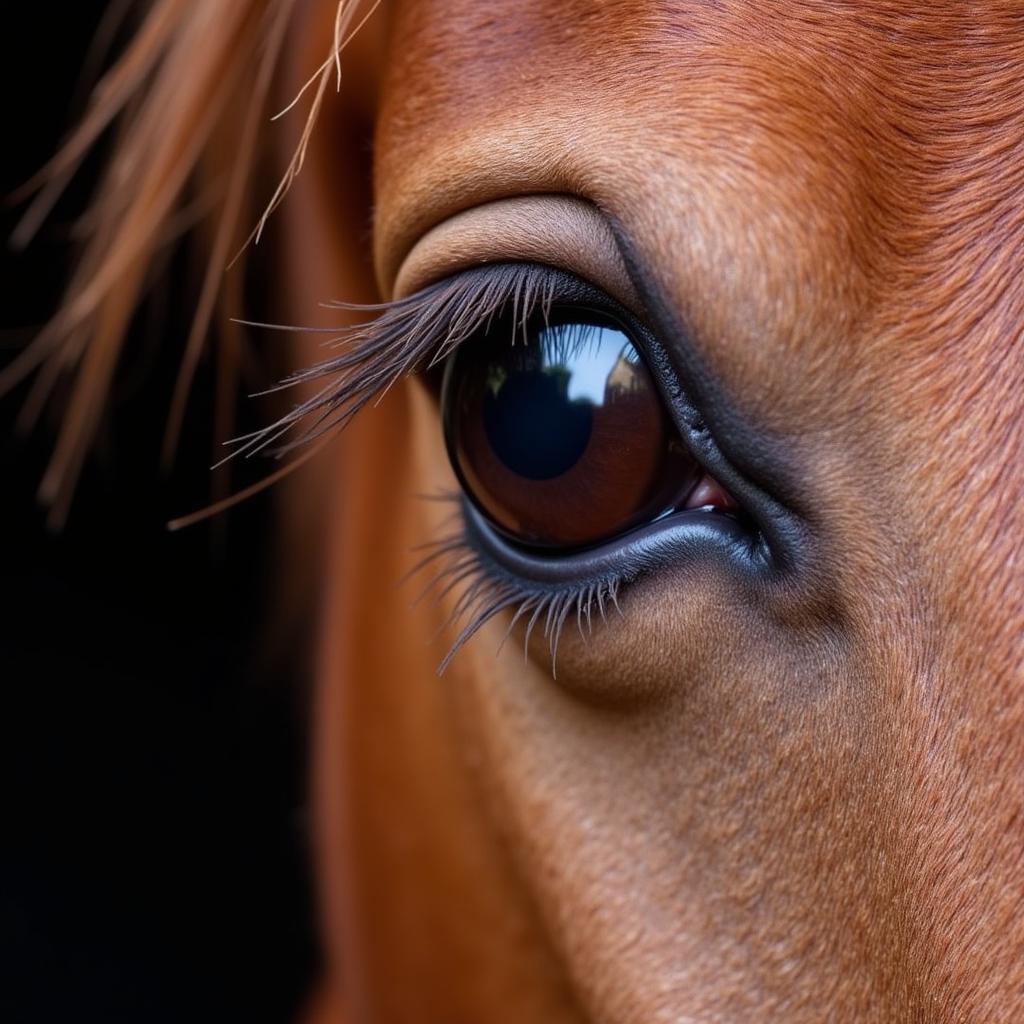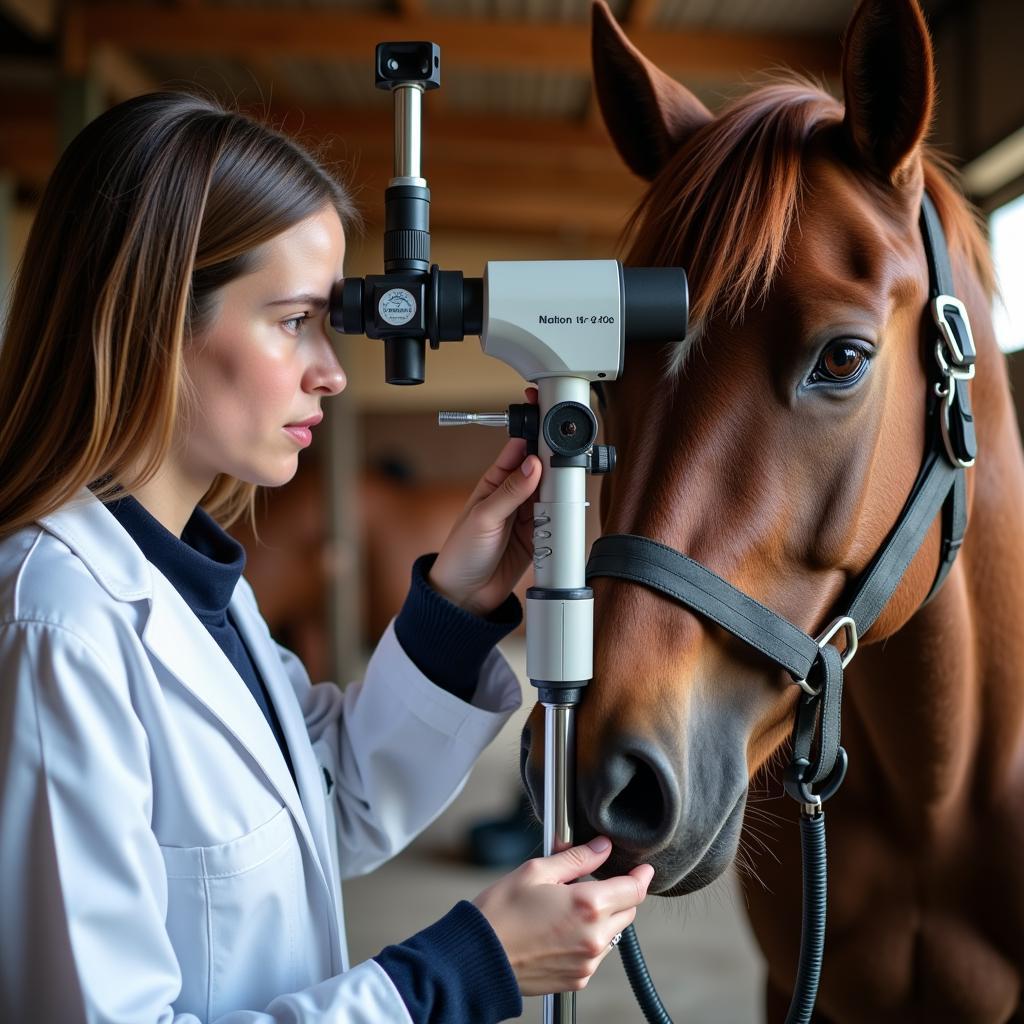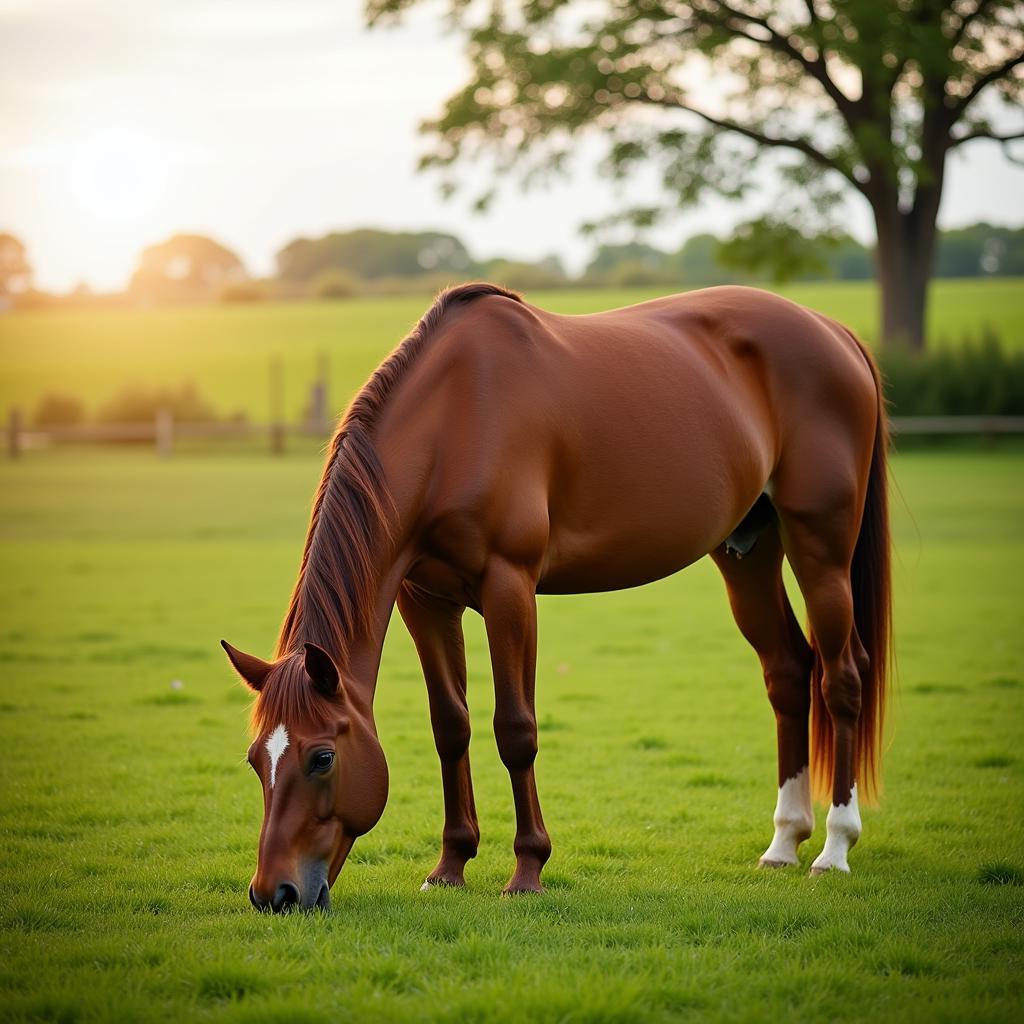Glaucoma In Horses is a serious eye condition that can lead to blindness if left untreated. It’s often referred to as the “silent thief of sight” because it can progress slowly, with subtle signs in its early stages. This comprehensive guide delves into the causes, symptoms, diagnosis, and treatment options for glaucoma in horses, empowering horse owners with the knowledge to protect their equine companions’ vision.
What is Glaucoma in Horses?
Glaucoma occurs when there’s a buildup of pressure within the eye, specifically in the area known as the aqueous humor. This fluid nourishes the eye and helps maintain its shape. However, if the fluid’s drainage system becomes blocked or compromised, pressure builds up, damaging the optic nerve. The optic nerve is responsible for transmitting visual information from the eye to the brain, and damage to this nerve can lead to vision loss.
Causes of Glaucoma in Horses
Glaucoma in horses can be primary or secondary, meaning it develops on its own or as a result of another eye condition:
- Primary Glaucoma: This type is less common and is often hereditary. Certain breeds, such as Arabians, Thoroughbreds, and American Quarter Horses, may be predisposed.
- Secondary Glaucoma: This type develops as a complication of another eye problem, such as:
- Equine Recurrent Uveitis (ERU): This inflammatory eye disease is a leading cause of secondary glaucoma in horses.
- Cataracts: Clouding of the eye’s lens can interfere with fluid drainage, increasing pressure.
- Lens Luxation: Displacement of the eye’s lens can obstruct fluid flow.
- Tumors: Growths within the eye can block drainage pathways.
- Eye Trauma: Severe injuries can damage the eye’s structures and lead to glaucoma.
Recognizing the Signs: Symptoms of Glaucoma in Horses
Early detection is crucial for managing glaucoma and preserving vision. Be vigilant and watch for these potential signs:
- Excessive Tearing (Epiphora): The affected eye may water more than usual.
- Cloudiness of the Cornea: The clear front surface of the eye may appear hazy or opaque.
- Enlarged Eye (Buphthalmos): The affected eye may appear larger than the normal eye.
- Redness of the Sclera: The white part of the eye may become bloodshot.
- Squinting or Closing the Eye (Blepharospasm): The horse may show signs of discomfort by squinting or keeping the eye closed.
- Light Sensitivity (Photophobia): Bright light may cause discomfort.
- Reluctance to Move or Head Shying: Vision loss can make a horse hesitant to navigate its surroundings.
- Changes in Behavior: A normally docile horse may become irritable or anxious due to vision problems.
 Close-up of a Horse's Eye Showing Signs of Glaucoma
Close-up of a Horse's Eye Showing Signs of Glaucoma
Diagnosis: Confirming Glaucoma in Horses
If you suspect glaucoma in your horse, immediate veterinary attention is essential. The veterinarian will conduct a thorough eye examination, including:
- Tonometry: This test measures the pressure within the eye using a specialized instrument called a tonometer. Elevated pressure readings are a key indicator of glaucoma.
- Gonioscopy: This examination allows the veterinarian to visualize the drainage angle of the eye, assessing its openness and fluid flow.
- Ophthalmoscopy: Using an ophthalmoscope, the veterinarian can examine the internal structures of the eye, including the optic nerve, retina, and blood vessels, checking for any abnormalities or damage.
Treatment Options: Preserving Vision in Horses with Glaucoma
Treatment for glaucoma in horses focuses on reducing intraocular pressure and preventing further damage to the optic nerve. The specific approach depends on the severity of the condition and the underlying cause:
- Medications:
- Topical Eye Drops: These medications help to reduce fluid production or improve drainage within the eye.
- Oral Medications: In some cases, oral medications may be prescribed to further lower intraocular pressure.
- Surgery:
- Laser Surgery: Laser procedures can help to improve fluid outflow in some cases.
- Cyclocryotherapy: This procedure uses extreme cold to destroy some of the tissue that produces aqueous humor, reducing fluid production.
- Enucleation: In severe cases where blindness is inevitable or the eye is causing significant pain, surgical removal of the eye (enucleation) may be recommended to provide relief.
 Veterinarian Using Specialized Equipment to Examine a Horse's Eye
Veterinarian Using Specialized Equipment to Examine a Horse's Eye
Living with Glaucoma: Long-Term Management
If your horse has been diagnosed with glaucoma, long-term management is crucial to maintain comfort and quality of life:
- Regular Eye Exams: Frequent veterinary checkups are essential to monitor intraocular pressure, assess treatment effectiveness, and detect any changes in the condition.
- Medication Compliance: Administer prescribed medications exactly as directed by your veterinarian, even if your horse’s eye appears to be improving.
- Environmental Modifications: Provide a safe and predictable environment for your horse, especially if vision is impaired. Avoid sudden changes in routine or surroundings.
- Supportive Care: Offer emotional support and reassurance to your horse throughout the treatment process.
Preventing Glaucoma in Horses
While not all types of glaucoma are preventable, there are steps you can take to reduce the risk for your horse:
- Regular Eye Care: Schedule routine eye exams for your horse, especially if they belong to a breed prone to eye conditions.
- Promptly Address Eye Problems: Seek immediate veterinary attention for any signs of eye irritation, inflammation, or injury.
- Genetic Considerations: Be mindful of potential hereditary factors, especially when breeding horses.
- Manage Underlying Conditions: If your horse has a pre-existing eye condition like ERU, work closely with your veterinarian to manage the condition effectively and minimize the risk of complications.
 A Horse Grazing Peacefully in a Green Pasture
A Horse Grazing Peacefully in a Green Pasture
FAQs: Frequently Asked Questions About Glaucoma in Horses
Can glaucoma in horses be cured?
Unfortunately, there is no cure for glaucoma in horses. However, with early diagnosis, appropriate treatment, and diligent management, it’s often possible to slow the progression of the disease, preserve vision, and maintain the horse’s comfort.
Is glaucoma painful for horses?
Yes, glaucoma can be very painful for horses, especially as pressure within the eye builds up. Signs of pain may include squinting, excessive tearing, redness, and behavioral changes.
What should I do if I notice any of the symptoms of glaucoma in my horse?
If you suspect glaucoma or any other eye problem in your horse, contact your veterinarian immediately. Early intervention is critical for the best possible outcome.
Need More Information?
To learn more about eye problems in horses, visit our comprehensive guide on eye problems horses.
Contact Us for Expert Care
If you have any concerns about your horse’s eye health, don’t hesitate to contact us. Our team at Justus Horses USA is dedicated to providing exceptional equine care. Call us at 0772127271, email us at [email protected], or visit our facility located at QGM2+WX2, Vị Trung, Vị Thuỷ, Hậu Giang, Việt Nam. We’re available 24/7 to assist you and your equine companion.